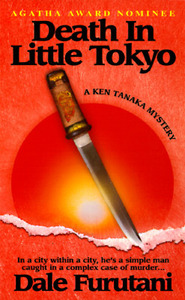Take a photo of a barcode or cover
Ken Tanaka may not be the most professional detective in the world but he inhabits a world that feels more like reality than most. I really enjoyed this one and how involved the Japanese interment camps, a piece of American history I still think is overlooked, are utilized in this story. A good LA mystery by a relatively unpopular author, which is unfortunate.
Received this book as a promotional giveaway at Bouchercon and so wasn't expecting too much, despite its Agatha Award nomination. It's been a long time, but I believe I heard the author speak there and remember him as mostly funny, in a hammy/cheesy sort of way. It also doesn't inspire confidence that this is the first book in a series that ended up being only two.
First impression is this is designed for mystery nerds. It begins with a murder mystery puzzle party and makes plenty of references to classic detective novels. The adventure launches when someone misinterprets a fake setup for a party as an actual detective office and tries to hire the narrator as a detective. So this plays into a fan fantasy in which the reader gets to imagine themselves accidentally falling into a job as a detective. This may explain how the book got award nominations and at the same time was not that generally popular; it may be a niche work for uber-mystery fans. It's also a problem to keep repeating the idea since it's both improbable that such a sequence would keep recurring as well as impossible for the narrator to continue being a complete newbie.
Once started, the storyline is pretty good at pulling you in, telling not just a detective tale, but also touching on racism, alcholism, economic issues, relocation camps, Japanese culture and even LA civic planning. Things are on a narrow edge most of the time, which keeps you reading quickly. If, however, you pause to think about it, you tend to be able to predict how things will turn out, or notice implausibilities.
First impression is this is designed for mystery nerds. It begins with a murder mystery puzzle party and makes plenty of references to classic detective novels. The adventure launches when someone misinterprets a fake setup for a party as an actual detective office and tries to hire the narrator as a detective. So this plays into a fan fantasy in which the reader gets to imagine themselves accidentally falling into a job as a detective. This may explain how the book got award nominations and at the same time was not that generally popular; it may be a niche work for uber-mystery fans. It's also a problem to keep repeating the idea since it's both improbable that such a sequence would keep recurring as well as impossible for the narrator to continue being a complete newbie.
Once started, the storyline is pretty good at pulling you in, telling not just a detective tale, but also touching on racism, alcholism, economic issues, relocation camps, Japanese culture and even LA civic planning. Things are on a narrow edge most of the time, which keeps you reading quickly. If, however, you pause to think about it, you tend to be able to predict how things will turn out, or notice implausibilities.
A twist on classic hard boiled mysteries
Ken Tanaka is pretending to be a detective for a mystery party he's hosting. He sets up a fake detective's office as a prop when a beautiful blonde walks in and hires him for a job. The set up is deliberately reminiscent of Raymond Chandler, but the author weaves in a hefty dose of real local history to the ground the story in the modern day.
Ken Tanaka is pretending to be a detective for a mystery party he's hosting. He sets up a fake detective's office as a prop when a beautiful blonde walks in and hires him for a job. The set up is deliberately reminiscent of Raymond Chandler, but the author weaves in a hefty dose of real local history to the ground the story in the modern day.

